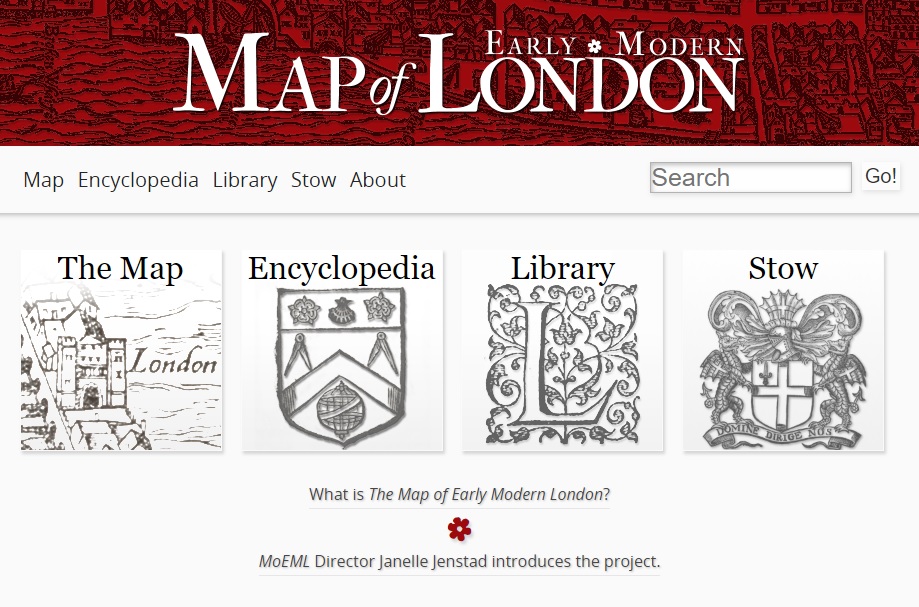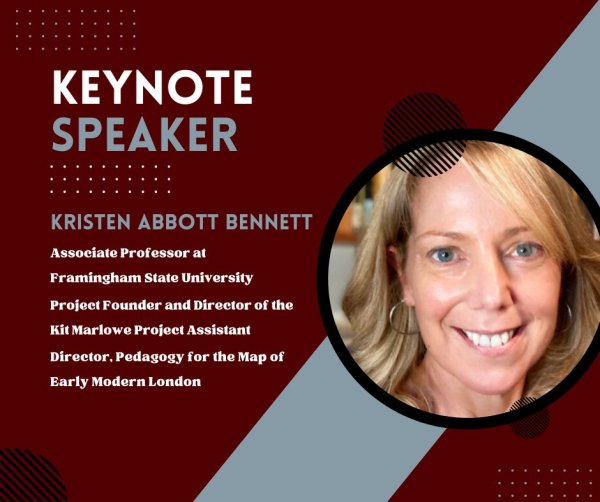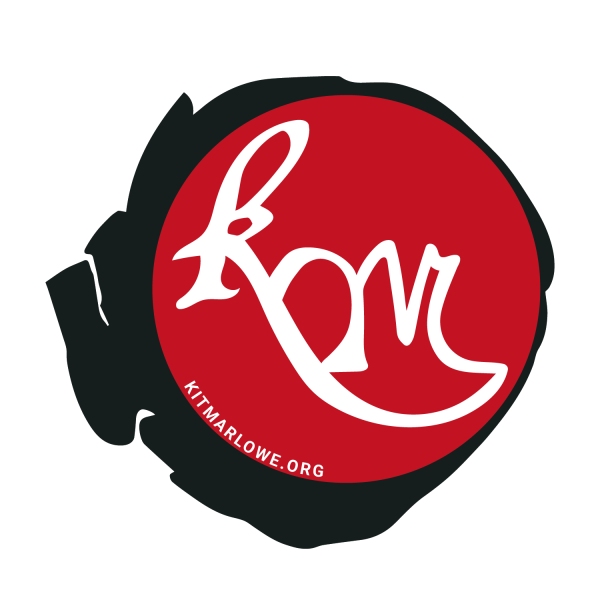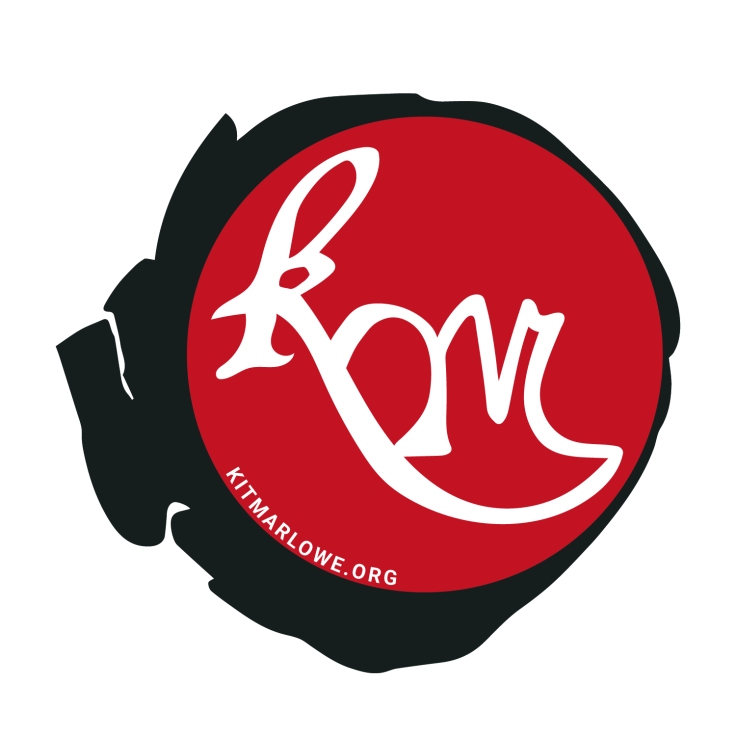Rebuilding this site to serve as a kind of bio/blog sphere. More soon!
Folio Futures
So excited to welcome @EarlyModConv to campus next week! ✨ https://t.co/95dS4g2Mqc
— Alexandra E. LaGrand (@aelagrand) April 20, 2024
Feature Writing Profile
by, Allie Mosher
Kristen Abbott Bennett first learned how to encode in an empty hotel restaurant in New Orleans at a Shakespeare conference.
Bennett and Dr. Janelle Jenstad, the colleague who first taught her TEI (Text Encoding Initiative), then decided to teach a collaborative course in Victoria, British Columbia – where Jenstad teaches – and Stonehill College – where Bennett worked at the time.
Since the Digital Humanities program had not yet taken shape at Stonehill, Bennett called her course “Pop Culture & ‘Bibliodigigogy’ in Early Modern England,” and it remains a highlight of her career, she said. (See sample materials published by Northeastern University, Women Writers Project)
“We definitely had a spirit of adventure! I had barely learned how to code, and next I was teaching it. That’s how Digital Humanities is,” Bennett said.
In Digital Humanities, encoding consists of digitizing archival texts and making them available using consistent editorial practices like those developed by the TEI (Text Encoding Initiative).
Now an Associate Professor of English at Framingham State University, Bennett keeps up a busy schedule between teaching ancient, medieval, and early modern literature, as well as working on The Kit Marlowe Project, which she founded and directs. This project is an open-access site for students to discover more about Christopher Marlowe – for whom Bennett’s cat is named – through transcriptions, encoding, and archival work.
“My students were frustrated that there was little about Marlowe out in the wilds of the internet. I half-jokingly suggested they create a site for all things Marlowe and they leapt at the opportunity. It was magical,” Bennett said. “I didn’t plan it. It just happened. And it still keeps happening.”
Diving headfirst into projects like this is a common aspect of Bennett’s life. As a student, she wrote her dissertation on the 16th century playwright and poet Thomas Nashe, despite being told that it was “career suicide,” she said.
“But I thought if I could do Nashe, I could do anything,” she added.
Caroline Hawkes, a junior English major at FSU, was a teaching assistant for two of Bennett’s classes and is currently an intern for The Kit Marlowe Project.
“When she (Bennett) originally asked me to TA, I was hesitant,” said Hawkes. “It was an environment I wasn’t expecting to like but I ended up really appreciating. … It was a very welcoming, friendly environment.
“I know that [The Kit Marlowe Project is] a resource that other people can use, and I think that’s amazing, but something else that is really cool about it is it is a very easy way for people to get experience with coding.”
Adam Levine, a senior English major at FSU, said Bennett’s course ‘Development of the Drama’ was one of the first classes he took at the school after transferring. “She was one of the first professors I had [at FSU],” he said.
“And then I just loved her so much I took ‘Intro to Digital Humanities’ with her [the next semester],” Levine added. “Even though Development of the Drama and Digital Humanities are very different courses … she was super passionate about both of them.”
Levine said, “from my understanding … Kit Marlowe was another poet during Shakespeare’s time … and that’s her passion.”
Christopher Marlowe, William Shakespeare, and Thomas Nashe are all writers Bennett said she tends to focus on in her teaching and projects. But her interest didn’t always lie in the Renaissance, she said.
“I started as an Americanist. And then I went and read what they read. And that’s how I landed on Shakespeare and Spenser and Nashe and Marlowe,” said Bennett. “I love this period because it helps me find some grounding in a world that I don’t understand.”
“The more I study early literature and history the more I feel like we’re all connected,” Bennett added. “We got through that, and people always think we’re never going to get through the next thing, yet we tend to.”
“Professor Bennett does so many things,” said Hawkes. “She is constantly writing things and has projects she’s working on. She has so many classes and so many interns. … I am really glad she’s getting the recognition of something being written about her.”
Digital Humanities Projects
The Map of Early Modern London
Assistant Director, Pedagogy (May 2021-present)
Module Mentor, Leadership Team (Summer 2017-May 2021)

Folger Digital Anthology of Early Modern English Drama
Scholarly Advisory Committee (July 2015 – June 2018)

Courses Taught
Following is a list of English and Digital Humanities courses I have taught at Framingham State University since Fall 2018.
English Courses (16)
ENGL 100: Introduction to College Writing
ENGL 110: Expository Writing
RAMS 101-EN: All the World’s a Stage
RAMS 103-ENX: Creative Thinking through Creative Writing: Drama & Shakespeare
ENGL 220: Shakespeare
ENGL 220X: Shakespeare
ENGL 251: British Literature I: Old English to 1680
ENGL 265: Western Literature: Origins to the Renaissance
ENGL 271: Development of the Drama
ENGL 317: Studies in Shakespeare: London Calling
ENGL 317/ENGL 835: Studies in Shakespeare: Shakespeare’s Worlds (Hybrid: Graduate/Undergraduate)
ENGL 314/ENGL 804: English Renaissance Literature (Hybrid: Graduate/Undergraduate)
ENGL 407: Chaucer
ENGL 495: (Supervisor) Internship in English (Kit Marlowe Project; Rams Write)
HNRS 480-03X: Honors Thesis
ENGL 985: Master’s Thesis in English
Digital Humanities Courses (5)
DGHM 110: Introduction to Digital Humanities
DGHM 110X: Introduction to Digital Humanities (Honors)
DGHM 310: Inventing Digital Humanities
DGHM 390: Special Topics in Digital Humanities
DGHM 495: Internship in Digital Humanities
Research
Monograph
Teaching Shakespeare’s Theatre of the World. Cambridge Elements Series, Cambridge UP (Under contract; due December 2023).
Critical Scholarly Editions
Editor. Love’s Labour’s Lost. Internet Shakespeare Editions, University of Victoria Press (In-progress).
Guest Editor. Explorations in Renaissance Culture, Vol. 48.1, “Special Issue: Early Modern English Sati/yre,” Brill, April 11 2022, doi.org/10.1163/23526963-04801000.
Editor and Introduction. Conversational Exchanges in Early Modern England (1549-1640). Cambridge Scholars Publishing, 2015.
Peer-reviewed Articles and Chapters
“The Pedagogy of Thomas Nashe.” The Oxford Handbook of Thomas Nashe, Oxford UP (Chapter under contract, due January 2024).
Co-author with Janelle Jenstad. “Collaborative Bibliodigigogy: Teaching Bibliography with Digital Methodologies and Pedagogical Partnerships.” Digital Pedagogy in Early Modern Studies: Method and Praxis, New Technologies in Renaissance Studies, Edited by Andie Silva and Scott Schofield, U Chicago P, December 2022.
“Introduction to the Special Issue: Early Modern English Sati/yre.” Explorations in Renaissance Culture, Vol. 48.1, “Early Modern English Sati/yre,” Brill, April 11 2022. doi.org/10.1163/23526963-04801004.
“Rhetorical Swordfighting and Satire in Thomas Watson’s Hekatompathia.” Explorations in Renaissance Culture, Vol. 48.1, “Early Modern English Sati/yre,” Brill, April 11 2022, doi.org/10.1163/23526963-04801001.
‘“Seeds together driven’: The Kit Marlowe Project’s Origin and Metamorphoses.” Interdisciplinary Digital Engagement in Arts & Humanities (IDEAH), Vol. 2.1, 28 July 2021, doi: https://doi.org/10.21428/f1f23564.665a6b94.
Co-author with Andrew Jeromski. ‘“The Glory of Our Sexe’: Elizabeth I and Early Modern Women Writers.” Women Writers in Context, Women Writers Online, Northeastern University, May 2020, wwp.northeastern.edu/context/#bennett.glory.xml.
“Telescoping Translation: ‘Hero and Leander,’ Lenten Stuffe, and Bartholomew Fair.” Marlowe Studies: An Annual, Vol. 6, 2016.
“Negotiating Authority through Conversation: Thomas Nashe and Richard Jones.” Conversational Exchanges in Early Modern England (1549-1640), edited by Kristen Abbott Bennett, Cambridge Scholars Publishing, 2015, pp. 102-131.
“At the Crossroads: Intersections of Classical and Vernacular English Protest Literature in Pierce Penilesse.” Essay cluster: “Literature of Protest.” Upstart: A Journal of English Renaissance Studies,
August 2015, upstart.sites.clemson.edu/Essays/protest/bennett_crossroads.xhtml.
“Bridging the Gap between Digital and Material ‘Print’ Cultures in Early Modern Literary Studies.” This Rough Magic, A Peer-Reviewed, Academic, Online Journal Dedicated to the Teaching of Medieval and Renaissance Literature, December 2014, http://www.thisroughmagic.org/abbott%20bennett%20article%202.html.
“Red Herrings and the ‘Stench of Fish’: Subverting ‘Praise’ in Thomas Nashe’s Lenten Stuffe.” Renaissance and Reformation/Renaissance et Réforme, Vol.37, no.1, 2014, pp. 87-110, jps.library.utoronto.ca/index.php/renref/article/view/21283,
‘“I moot speke as I kan’: The Squire’s Optimistic Attempt to Circumvent Rhetorical ‘Following’ in The Canterbury Tales.” This Rough Magic, A Peer-Reviewed, Academic, Online Journal Dedicated to the Teaching of Medieval and Renaissance Literature, December 2011, http://www.thisroughmagic.org/abbott%20bennett%20article.html.
“Re-conceiving Britomart: Spenser’s Shift in the Fashioning of Feminine Virtue between Books 3 and 5 of The Faerie Queene.” The Anachronist: A Journal of English and American Studies. Vol. 14, 2009, pp. 1-23.
“Preposterous Translation: Ass Lore and Myth in A Midsummer Night’s Dream.” Transverse: A Comparative Studies Journal. Vol. 7, Spring 2007, pp. 31-42.
“Translating Transcendentalism: A Revelation of Emersonian Enthusiasm.” Interactions. Vol.16.2, 2007.
Invited Book Reviews
Wit’s Treasury: Renaissance England and the Classics, by Stephen Orgel. Renaissance and Reformation/ Renaissance et Réforme, U Toronto P, Spring 2022.
The Cambridge Companion to Shakespeare’s Language. Edited by Lynne Magnusson with David Schalkwyk. Renaissance Quarterly, Cambridge UP, Vol. LXXIV, No. 1, Spring 2021.
Middle English Marvels: Magic, Spectacle, and Morality in the Fourteenth Century, by Tara Williams. Renaissance Quarterly, Cambridge UP, Vol. 72, No. 2, Summer 2019, pp. 751-752.
Teaching Shakespeare and Marlowe: Learning versus the System, by Liam Semler. This Rough Magic, A Peer-Reviewed, Academic, Online Journal Dedicated to the Teaching of Medieval and Renaissance Literature, June 2014, http://www.thisroughmagic.org/abbott%20bennett%20review.html.
Railing, Reviling, and Invective in English Literary Culture, 1588-1617: The Anti-Poetics of Theater and Print, by Maria Teresa Micaela Prendergast. Renaissance Quarterly, Vol. 66, no. 2, Summer 2013, pp. 734-735.
Professional Public Writing
“Teaching with TAPAS: The Kit Marlowe Project.” August 23, 2023. https://tapasproject.org/content/teaching-tapas-kit-marlowe-project
Co-author with Liam E. Semler and Claire Hansen. “Shakespeare Redrawn: Reflections on Shakespeare Reloaded’s COVID-19 Lockdown Activity.” mETAphor, Issue 2, 2021, English Teachers Association, New South Wales.
“Collaboration in Undergraduate Research Acts as Force Multiplier.” The Arts & Humanities Division of the Council for Undergraduate Research, November 4, 2020, curartsandhumanities.org/2020/11/04/force-multiplying-collaboration-in-undergraduate-research/.
“The Preposterous Publication History of Elizabeth I’s ‘Golden Speech.’” “Intertextual Networks,” Women Writers Project, Northeastern University, May 21, 2019, wwp.northeastern.edu/blog/golden-speech/.
“The Queen’s Two Corpora: Finding Elizabeth using the WWO Database.” Women Writers Project, Blog Posts, June 13, 2017, http://www.wwp.northeastern.edu/blog/finding-elizabeth/.
“The Four Points of Character Analysis.” The Folger Shakespeare API Tools, The Folger Shakespeare LibraryMay 2019, www.folgerdigitaltexts.org/api.
Co-author with Janelle Jenstad. Pop Culture and ‘Bibliodigigogy’ in Early Modern England. “Syllabus”; “Stationers Assignment”; “EEBO Assignment.” Women Writers Online, Women Writers Project, “Early Modern Digital Pedagogies Workshop, 30 March 2016.” Northeastern University, wwp.northeastern.edu/outreach/seminars/emdp_2016-03/10.
Guest Editor. “How to Use Early English Books Online,” “How to Use the English Broadside Ballad Archive,” “How to Use the Folger Digital Image Collection,” “How to Use Project Gutenberg,” “How to Use Internet Shakespeare Editions.” The Map of Early Modern London. Ed. Janelle Jenstad. University of Victoria, 2014, mapoflondon.uvic.ca/PERS1.htm.
Kristen Abbott Bennett
Hello, fellow travelers! I’m resurrecting this site to serve in part as a repository for my biographical information and hopefully to share curiosities I discover along my journey as a teacher, researcher, and digital humanist.
In lieu of a bio, here’s a short feature Allie Mosher (Framingham State University, Class of 2025) wrote recently.
Nashe, McLuhan & Me
When I returned to Tufts for commencement a while back, a friend from my English grad program was surprised by my active use of digital humanities tools for research and teaching; she knows how much I love spending time in archives. On reflection, my early research on Elizabethan satirist Thomas Nashe directly anticipated what I like most about working in the digital humanities – getting “under the hood” of a text or corpus, taking it apart, figuring out how it works, and then re-framing extant arguments to create original scholarship. Nashe utilizes extraordinarily dense intertextual networks that juxtapose prose, drama, poetry, chronicle history, chorography, philosophy, multitudes of Latin tags, and topical in-jokes that required me to learn about early modernism across disciplines and often languages. He also frequently deploys allusions to classical, medieval, and contemporary works as defensive postures designed to occlude subtexts of often seditious criticism of his Queen, her court, and Crown politics. Until his works were summarily banned in 1599, these maneuvers worked.
Nashe remains my spirit animal in part because one cannot read his work in isolation. That is to say, if Nashe makes sense, then he makes sense in conversation, in the context of these multitudes of intertexts. The Thomas Nashe Project is currently using digital tools for authorship attribution. Someday I should like to see a database vast enough to analyze Nashe’s works in the context of of his intertexts – and that day is not too far off.
My journey from Nashe to working with digital media distantly echoes media guru Marshall McLuhan’s. McLuhan pioneered digital media studies after writing his Cambridge dissertation about Thomas Nashe and the Learning of His Time. McLuhan’s dissertation examined Nashe’s work in the context of the classical trivium: grammar, dialectic, and logic. What struck me when I read McLuhan’s diss was how deeply intertwined writing styles and the writers’ theological and political positions were.
McLuhan understood that the parallel explosions of information technology at the turn of the seventeenth-century and the turn of the twentieth offer an ideal opportunity to think critically about how knowledge is created in the public sphere. Print culture directly informed early modern rhetorical practices across discourses and vice versa. He is also said to have been highly amused when a print run of his influential text The Medium is the Message was misprinted as The Medium is the Massage. I too prefer “massage” – digital media does not directly translate or convey information, but represents an act of mediation, and subsequently interpretation. Whether the intermediary is a human or a computer, there’s always more to digital media than meets the eye. And, one can discover much by using DH tools to explore any kind of digital artifact’s metadata – the stuff under the hood.
But many still ask: what are the digital humanities? Digital Humanities Quarterly offers a useful definition on their “About” page:
I like the three “E’s” in this definition and I would argue that the goal of digital humanities is to explore, evolve, and engage in ways that help us re-frame our conventional understandings of information processing and knowledge making.
Tufts’ own Perseus Project offers a watershed example of digital humanities in action – I have seen the project evolve from hero to hydra as they work toward their goal of making the “full record of humanity” accessible. The Perseus team has devoted extraordinary amounts of time to translating, transcribing, and encoding pre- and early modern texts. (And, I’d like to thank everyone involved for continually helping me stretch my Latin proficiency.)
Perseus’ digital curation efforts – like those at The Folger Shakespeare Library, The Map of Early Modern London, and The Kit Marlowe Project are critical for cultural preservation. Plus, these digital resources provide opportunities to explore how patterns of language and knowledge making emerge across works, time, and discourses in ways that material texts cannot.
At a DH talk I gave with my colleague Mary Erica Zimmer at Harvard’s Mahindra Humanities Center in February 2017, the moderators invited the seminar attendees to introduce themselves by name, affiliation, and discipline. When the introductions reached Northeastern’s Syd Bauman from the Women Writers Project, he replied: “undisciplined.” Syd might be on to something.
One talks much about “interdisciplinarity” in the context of digital humanities. But the prefix, “inter,” or “between,” suggests precisely the kinds of gaps one encounters institutionally. More often than not, “interdisciplinary” courses are a pastiche of content areas and methods that illuminate shared practices and points of content – and that’s great! (I’ve taught a few of these myself.) But the prefix “inter-” insistently informs disciplinary difference.
Such disciplinary difference appeals to educational systems and institutions because it facilitates creating manageable taxonomies, specifically, manageable taxonomies that can be assessed. But knowledge does not evolve along disciplinary boundaries. Scholars understand this fact.
DH platforms and projects do not simply connect the space between disciplines – as the “inter,” the prefix to “interdisciplinary” suggests. These connections enact not just links, but extensions of knowledge that are extensible – like the XML (extensible markup language) we use for markup. To be fair, knowledge has historically been extensible, but written representations of knowledge have conditioned humans to think linearly and two-dimensionally.
Until now.
The Perseus Project’s ambition to make “the full record of human knowledge available” is wildly exciting – in part because they’re clearly not worried about scope-creep! In all seriousness, at the crux of every project I’ve worked on is a desire to aggregate as much data as possible so that one may explore the evolution of knowledge in the context of its inception. By building increasingly large datasets of that reflect “the record” of human knowledge, we will have the opportunity to recognize contingencies that make discoveries possible, we will realize that what seems like a fixed “record” is anything but.
I can’t help but think that by translating knowledge into the language of computer networks, we transform it into energy.
Already, DH projects emerging around the globe are, like Gutenberg’s printing press, agents of change, traversing discourses and simultaneously extending them node by node to revolutionize the way we make knowledge today — or, perhaps, better reflect the way knowledge has always already been made.
– Kristen Abbott Bennett, 16 March 2018


